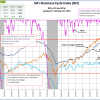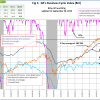A reliable source for recession forecasting is the unemployment rate, which can provide signals for the beginnings and ends of recessions. The unemployment rate model (article link), updated with the January figure of 4.8%, does not signal a recession now.
Read more >
Blog Archives
The Unemployment Rate is Not Signaling a Recession: Update February 3, 2017
Forecasting Stock Market Returns with Shiller’s CAPE Ratio and its 35-Year Moving Average
- Shiller’s Cyclically Adjusted Price to Earnings Ratio (CAPE ratio) is at 27.8, which is 11.1 above its long-term mean of 16.7, signifying overvaluation of stocks and low forward returns.
- The alternative CAPE ratio methodology offered in this article references stock market valuation to a 35-year moving-average of the Shiller CAPE ratio instead of to the 1881-2016 fixed long-term mean.
- The latest CAPE ratio predicts a 10-year annualized real return of only 1.5%, whereas the presented methodology forecasts 5.8%, similar to the long-term market trend expected real return of 5.4%.
The iM Gold-Timer – Rev1
We have revised the iM Gold-Timer. The timer endeavors to signal long-term investment periods for Gold. It uses the SPDR® Gold Shares ETF: GLD. When not invested in GLD the model goes to 100% cash.
The Unemployment Rate is Not Signaling a Recession: Update January 6, 2017
A reliable source for recession forecasting is the unemployment rate, which can provide signals for the beginnings and ends of recessions. The unemployment rate model (article link), updated with the December figure of 4.7%, does not signal a recession now.
Read more >
The Unemployment Rate is Not Signaling a Recession: Update December 2, 2016
A reliable source for recession forecasting is the unemployment rate, which can provide signals for the beginnings and ends of recessions. The unemployment rate model (article link), updated with the November figure of 4.6%, does not signal a recession now.
Read more >
The Unemployment Rate is Not Signaling a Recession: Update November 4, 2016
A reliable source for recession forecasting is the unemployment rate, which can provide signals for the beginnings and ends of recessions. The unemployment rate model (article link), updated with the October figure of 4.9%, does not signal a recession now.
Read more >
No Recession Is Signaled By iM’s Business Cycle Index: Update October 27, 2016

Knowing when the U.S. Economy is heading for recession is paramount for successful investment decisions. Our weekly Business Cycle Index (BCI) would have provided early reliably warnings for the past seven recessions.
Read more >
No Recession Is Signaled By iM’s Business Cycle Index: Update October 20, 2016

Knowing when the U.S. Economy is heading for recession is paramount for successful investment decisions. Our weekly Business Cycle Index (BCI) would have provided early reliably warnings for the past seven recessions.
Read more >
Market Timing with ETFs SH and RSP: Using the iM-Composite & Standard Market Timers’ Rules
- This market timing model integrates the iM-Standard Market Timer and the iM-Composite Market Timer.
- This model switches between ETFs SH and RSP providing signals when to be short or long the stock market.
- The model does not utilize Bond ETFs, and is therefore not directly affected by the potential risk of rising interest rates.
- From 2001 to 2016 switching between SH and RSP provided significant benefits. This strategy would have produced an average annual return of 26.2% versus only 8.5% for buy&hold RSP.
No Recession Is Signaled By iM’s Business Cycle Index: Update October 13, 2016

Knowing when the U.S. Economy is heading for recession is paramount for successful investment decisions. Our weekly Business Cycle Index (BCI) would have provided early reliably warnings for the past seven recessions.
Read more >
